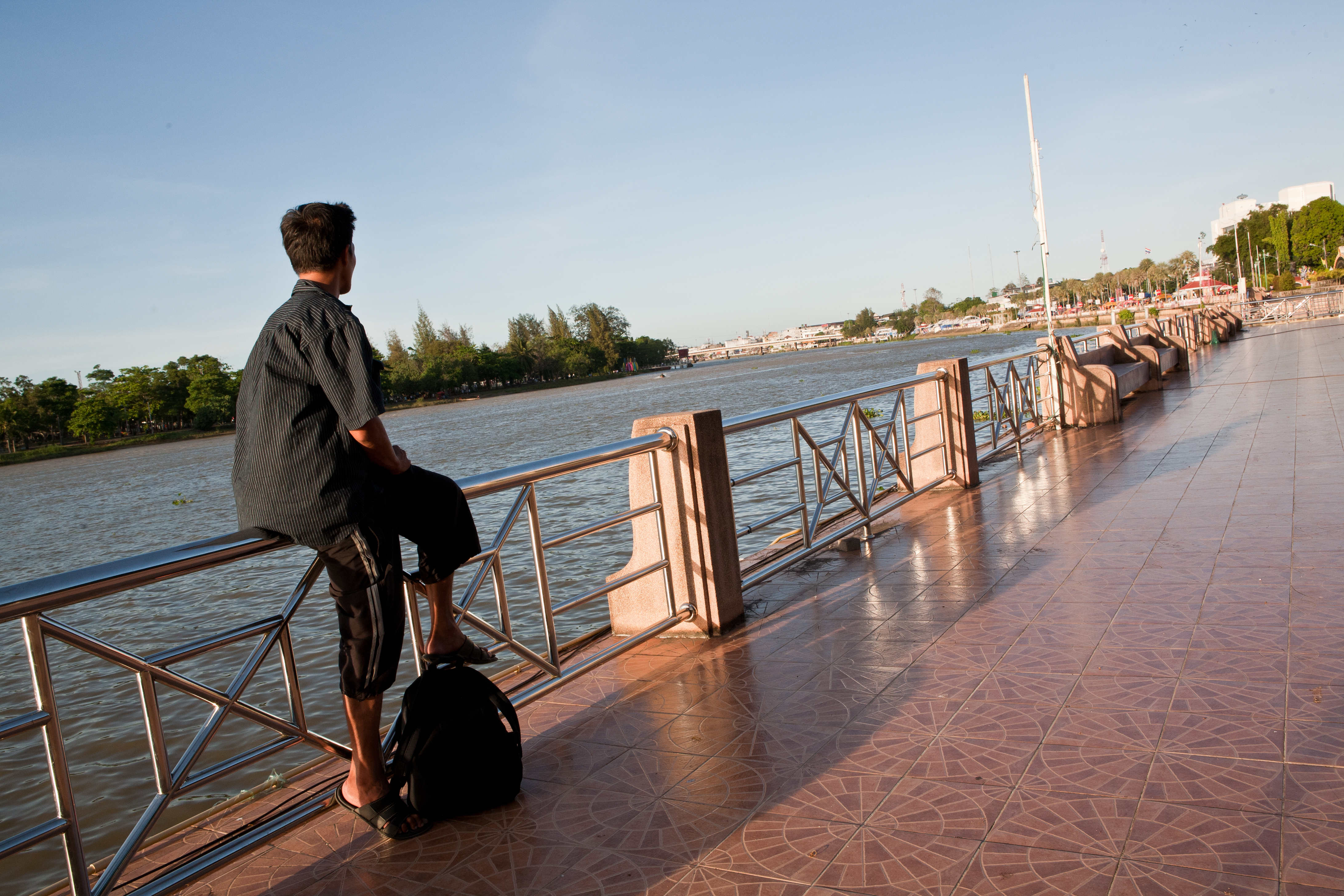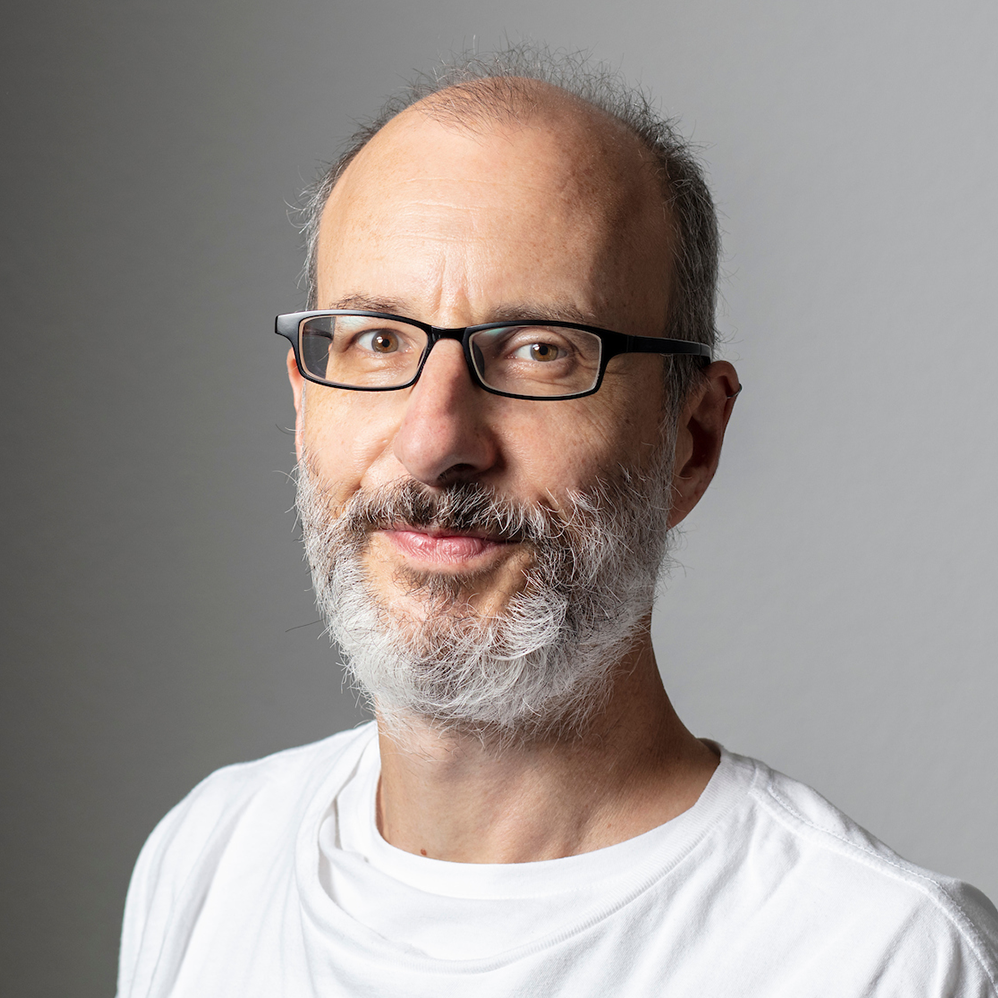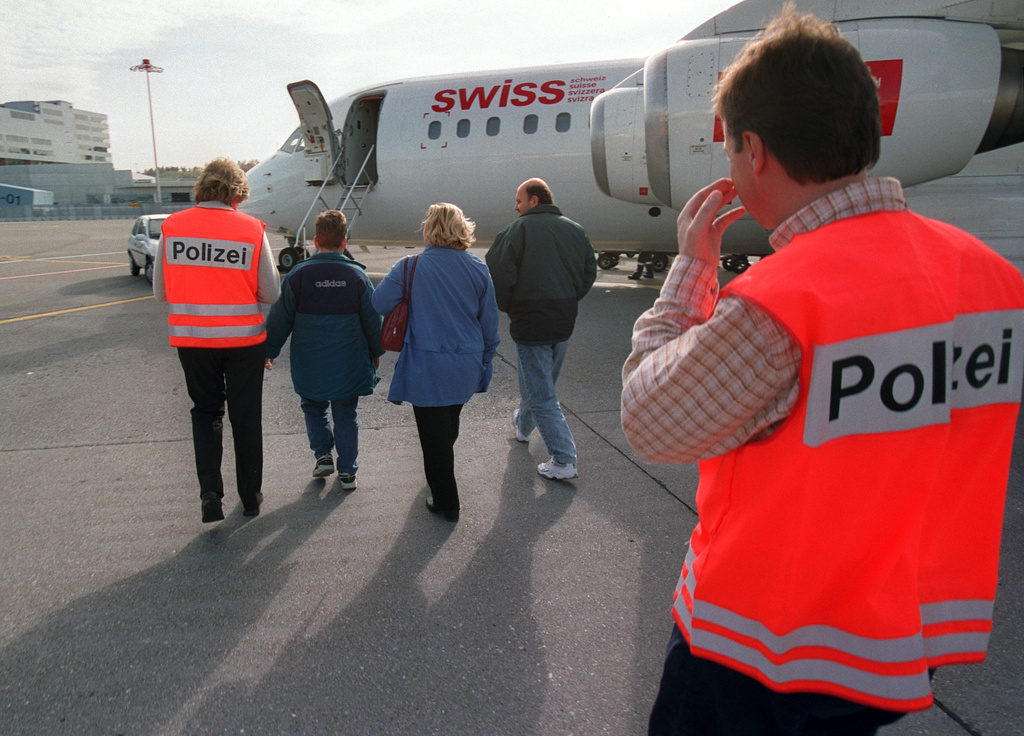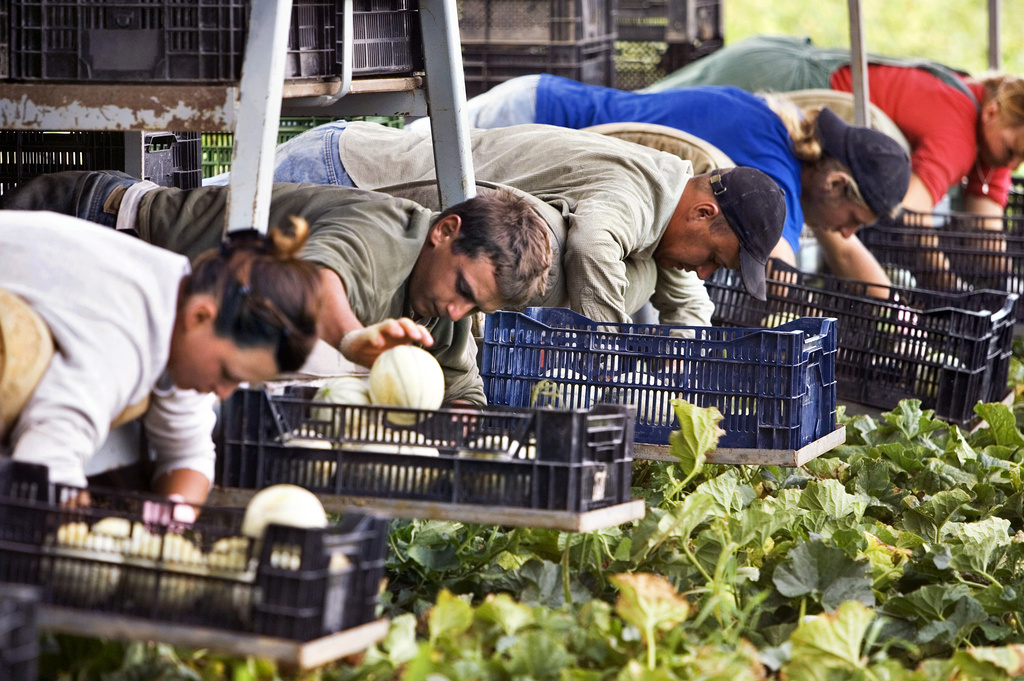“I want to build a new life for myself”

If you have spent most of your life in Switzerland, going back home to your country of origin may not be a realistic option. This is the story of Aek, a young Thai deported in 2008, whose biggest ambition is to get a second chance.
Aek has just finished his lunch: fried vegetables and three pieces of pork on a bed of white rice. For about 60 cents you cannot afford anything else in this restaurant, which has little to offer anyway except soups and fried fish. To drink, there is water from the stainless steel container placed on every table. The water is fresh, and above all, free.
Outside, the noise of passing pick-up trucks and scooters makes this hot and humid day even more oppressive. But the sky is clouding over, and a thunderstorm will bring some welcome relief. With rain expected, Aek’s day looks like being less strenuous.
Aek, who is a young man of about 30, works on the other side of the road which passes through the centre of Surat Thani, a town in the south of Thailand. His shift at the car wash in the service station will end at six in the evening. That’s nine hours of work for 280 baht a day (about SFr8 or $8.7), six days out of seven.
“Of course”, he tells me, “if I get sick and can’t come to work I don’t get paid. That’s the system here.”
When he had to take time off because of a foot inflammation caused by the cleaning products, Aek was forced to ask for a loan from his uncle. Also, during the floods of February 2011 his pay packet was empty. “A lot of the roads were under water. And anyway, when it rains, no one comes in for a car wash.”
All things considered, though, Aek can’t complain. He lives only a short distance from the car wash and so did not need to buy a scooter on credit. His employer pays part of the rent for the lodging which he shares with colleagues, who are mostly Burmese and Cambodians.
“Without his help I don’t know how we would be able to survive,” he says, showing me his room, which costs 500 baht per month.
Rebellious nature
Aek is not used to life as a Thai. He was born not far from Surat Thani, but he spent most of his life in Switzerland. As a child, aged five, he followed his mother to the canton of Appenzell Outer Rhodes, where a new stepfather was awaiting him.
Growing up in the culturally mixed family was not easy, however. Misunderstandings and disagreements between him and his adoptive father were all too frequent.
Some of this was due to the conservative mentality of rural eastern Switzerland, some due to what he calls his own rebellious nature, Aek explains to me in perfect Swiss-German dialect.
His mother sent him to the Pestalozzi village for children, in the Appenzell hills, which accommodates migrant youth with integration problems. The separation of his parents and the early loss of a step-brother had a further disturbing effect on the young Thai boy.
There followed a dark period, out of school and without work, in which he felt a lot of anger and depression. “I was staying with friends. I moved from one place to the next, but I didn’t always register with the authorities,” Aek remembers.
“I am no criminal”
Repeated infractions of the rules for foreign residents eventually brought about his downfall.
“When I went in to get my C [permanent resident’s] permit renewed, after it had already expired, the secretary called the immigration police right away. One hour later I found myself in jail.”
“To some extent it’s my own fault. I never responded to summonses from the authorities,” admits Aek, who tended to ignore the ordinary duties of the citizen (paying taxes, having compulsory health insurance, and so on). “But I am no criminal. I never dealt in drugs or was violent to anyone.”
What worsened his situation, Aek believes, was the behaviour of some officials, who according to him handled his case unfairly.
“I went to the cantonal offices of Thurgau and St Gallen. Everyone just told me to go talk to the other canton.”
“I got the feeling,” he goes on, “that no-one wanted me in their jurisdiction seeing as I did not have a job. This was also the period in which lots of workers were arriving from Germany, and in eastern Switzerland there was a fair amount of racism in the air.”
Money in pocket
For the young Thai immigrant, the verdict was severe: deportation and a five-year ban.
“I did not tell either my mother or my friends. I did not want to burden them with my problems. I could have appealed the deportation decision, but I preferred just to give up. To me it was clear: Switzerland did not want anything to do with me any more.”
Two days after his arrest, Aek was put on board a plane belonging to Swiss International Air Lines. The destination was Bangkok, and it was to be a one-way trip.
“They handcuffed me and took me through a separate entrance from the tourists. I was the first on the plane.”
When he got to Bangkok with the $100 in his pocket which a Swiss policeman had given him, Aek remembered a distant relative who lived not far from the airport.
“Luckily, for the first while, I was able to stay with her.” Then it was a long bus ride to Surat Thani – and the car wash at the service station.
Second chance
Aek can think of just one date: September 11, 2013. That is when the ban on entering Switzerland will expire. His Thai purgatory will be over.
“Living here is difficult, especially when you grew up somewhere else. For example, here you will never see a worker telling his boss how to do a job better. But I just feel like making my contribution, though people perceive my attitude as showing a lack of respect.”
“I want to go back to Switzerland. To see my mother and my friends. To build a new life for myself.”
Aek is aware that this second chance is not to be squandered. “I will work hard. I don’t care if it’s in a factory or some job paid by the hour.”
His intention is to start putting something aside. Savings will allow him to build a house and go back to Thailand – this time of his own free will.
Foreigners working in Switzerland or who intend to reside here for more than three months need a permit.
These permits, issued by the cantonal governments, are of different kinds: the “L” permit, for a brief stay (less than a year); the “B” permit, for temporary residence (time-limited); and the “C” permit for permanent residence (open-ended).
The determining factors are not just work skills, but also, importantly, the person’s country of origin.
Switzerland makes a distinction between people coming from the EU/Efta countries and those coming from the rest of the world, the so-called “third countries”.
EU and Efta citizens can take advantage of a key labour agreement – also known as Agreement on the Free Movement of People – signed by Switzerland and 27-nation bloc. This treaty, in force since 2002 and revised several times since then, gives European citizens the right to live and work in Switzerland.
Anyone coming from one of the “third countries”, like Thailand, faces much tougher rules. For example, only specialised and qualified workers are admitted.
On the other hand, persons living in third countries have the right to come to Switzerland under family reunification rules if a spouse or parent has a normal residence permit.
Deportation is invoked in the case of foreigners living in Switzerland without a valid permit; if they are guilty of serious or repeated offences against public order and safety; or if they are deemed a threat to the security of the country.
The procedures include: issuing of deportation orders, forcible expulsion and bans on re-entry.
When a deportation order is issued, it comes with a deadline to leave the country which may be between seven and 30 days.
In some cases, deportation may be immediate. For example, if the person is regarded as a danger to the security of the country or if there is evidence that the person intends to disobey the deportation order.
A ban on re-entry is imposed for a maximum period of five years. The period may be longer if the person concerned is deemed to represent a threat to public order and safety.
(Source: Federal legislation on immigration)
(Translated from Italian by Terence MacNamee)

In compliance with the JTI standards
More: SWI swissinfo.ch certified by the Journalism Trust Initiative



You can find an overview of ongoing debates with our journalists here. Please join us!
If you want to start a conversation about a topic raised in this article or want to report factual errors, email us at english@swissinfo.ch.